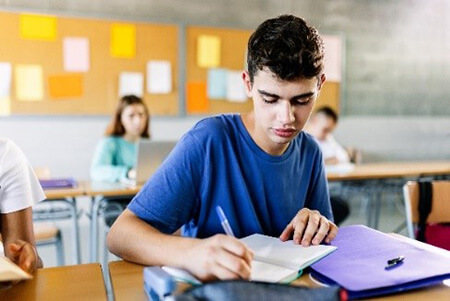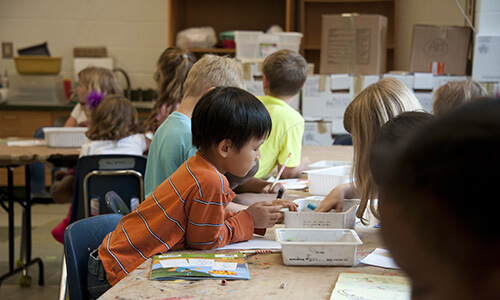Hello Students, your Teachers and your Parents! Welcome to the fresh academic term, post the summer vacation!
If you have chanced upon this Blog article before listening to the linked Podcast by the same name, we strongly recommend that you first enjoy listening to Paying Attention in Class – Part 1, before reading further. This blog is addressed to the adults as well, since their support and cooperation can greatly benefit you students in acquiring good and attentive study skills.
As promised in the podcast, let’s get straight to it! Here are the tips and tricks against each of the pointers to help you become more attentive in class.
CONTROL YOUR THOUGHTS:
This one seems to be one of the toughest things to put into practice, especially for GEN X students! So many things to do, people to meet, social media posts to read (& post), pics to click and more. To help you gain control over what your mind is doing, you can try these:

Keep Clear Off Distractions
The first is to GET away from them and then have the grit to STAY away from everything that could make you lose focus. You could try,
- Staying clear of items like your laptop, desktop, mobile phone, video games, …basically anything digital that has a ‘quick pleasure’ appeal.
- Keeping your surroundings distraction free – move away from a window, from a friend (at the wrong time for socialising) or an annoying classmate who badgers you while you are trying to concentrate.

Physical removal is the best way to be successful with both of the above. Like sitting somewhere else in class, keeping the digital distractors away and out of reach (even if it means handing it over to an adult family member)
Be in the Now:
Your brain just has to behave itself! Remember, no one but YOU are in control – so try to keep your thoughts from wandering from what is happening in the present, that requires your WHOLE self with concentration. No place or time for day-dreaming in class – save it for later. If any of these happen to you a lot, like

- …thinking about games, a special friend, other friends, family, books, an IPL match, play-zones or eateries to grab a treat, OR
- …thinking about upcoming exams, events, contests, a forthcoming holiday / trip, a new family purchase, or even a sad event,
… then you will want to stop and manually, willingly (or with help of a classmate / teacher) refocus on what’s happening at THAT time. Check yourself and then make yourself think about the lesson again. Eventually, it becomes a habit and you learn to daydream less and be in the NOW.

Review, Refocus, Realign:
Pay attention to and review what your mind is doing. Try saying back everything that your teacher has just stated in class, in your own head really emphasizing the important bits. Focus is a skill which needs to be exercised and developed, just like any other.
If you are ready for real challenge, try this! Put on some real loud music, or sit where there are multiple sources of distraction – and try completing your homework, or reading a book for critiquing! This requires you to consciously switch off from the ambient clutter and realign your mind to what is important.

Pump Up Your Own Motivation Level:
This is a given for all of us – when we are motivated to do something, it is easier to stay focussed, right? If the current teacher / lesson / activity is not really interesting, then you will have to work to create that motivation yourself. It can be frustrating and difficult at first, but you will eventually get the benefits of education, whether external people or activities inspire you or not.
Here is one example – Within what is going on, try to identify some aspect of the topic that is really interesting to you. This could help you to build a base for the learning you want to do. Say for example, you don’t care much for history, but you like the idea of the grandeur of Mughal Kings. Use that as a starting point for HOW the rest of the information is connected to your super-hero King. You’ll find that that makes it easier to focus on what you’re meant to be learning.
CHANGE THE WHAT & HOW OF WHAT YOU DO:
While we are sure you have “got this!” in terms of how you plan and pursue your day-to-day work, there is always scope for a little improvement, when it comes to bettering your Attentiveness Skills! Here are some ready tips – if you are already doing any of them, great! Take cues from the ones that are new, to help you to improve:
Prepare Before the Class:
Often, one needs to take time to get into the right mindset in order to pay attention; perhaps because you had missed the previous class or the teacher was absent or other preoccupations flooded your mind.
- Prior to the class starting, try to review the homework, or read from the coursebook, or skim over the previous day’s notes. This can help to get your brain into “class mode”, and you can have an easier time focussing.
- Prepare the immediate physical environment in time – by arranging your desk with the pen/pencil/eraser, books and notebooks, any other kit you may need for the subject.

Seek a Better Environment:
This is not just about getting rid of distractions around us. Even relocating from one’s usual spot, or sitting at a different place may help you to focus by changing what you can do and see from where you sit. By changing the environment, or the things around you, you can concentrate better. Become a forward-bencher instead of a back-bencher, or sit with different classmates, or in a different row.
You can even suggest to your teacher that the class could be taken at a new location: an amphitheatre, the garden, the terrace, a lab, etc. Your suggestion may help others focus!

Jump into Active Participation:
Active participation keeps your mind engaged and focused on the topic, because you need to be alert about what is being done or shared or opined about; you can’t afford to drift off or think about something else. A good way to participate is by participating – raise your hand
- ask questions,
- add value to what has been taught or shared,
- express a doubt or voice a myth/misconception that is generally believed to be true, and
- ‘mindfully listen’ and try to pick up important points to frame new questions.
Take Notes:
Note-taking is an art, but a really useful way to focus on what is being taught, even if the notes may a repetition of what you may later read in the coursebook. Make an outline or a mind-map of the topics, sub-topics and further layers, with a few side notes can also help.

Take Out Time for Research
At times, you may feel clueless with what is being taught in class; totally understandable and normal! If the topic is a very new one or appears to be complex, a little extra research can help you to pay better attention and thus help you to understand your lesson.
Researching also means that you are actually learning OUTSIDE your class, which technically makes up for your remaining inattentive IN class. There are a lot of student sites that can help you find additional information for your grade-level subjects and topics, but do use the internet with caution.
Create A Routine:
It is said that good students are creatures of routine! While this tip may be an immediate source of allergy for many of you Gen X kids, (who seem to have mastered the art of going through a day with no structured plan!) there is much truth in this saying. AND, if the lack of routine is bundled with lack of attention in class, then you DO have to Change your Action, here and now! Getting distracted, distracting others, not knowing what is happening in the NOW are all inappropriate habits.

Just like any other habit, you can break it by replacing it with other good habits. Develop a routine that will help you to focus in class, making that time just for school and learning. Factor in the times of relief, when you can also have lots of fun.
By teaching and training your brain what time of the day is for what, and by sticking to the routine, you can train your mind to pay better attention.
PREPARE AND PRIME YOUR PHYSICAL SELF:
The mind & body work hand in hand, and their correct nourishment, with a proper routine leads to a happy stress-free life.
Sleep Enough:
The first markers of a healthy body is a ‘rested’ body – so getting enough sleep at night or making up for sleep deficit during the day is very important o have an alert brain. Here are some parameters to clock your sleep schedule:
- Under 12 yrs: you need 10 hrs of sleep
- Above 12 yrs: you need 8 to 9 hrs of sleep
Having said that, it is important to realise that
- some bodies need more sleep,
- some bodies can do with less,
- but oversleeping can also make one tired and lethargic.

Maintain a Good Diet:
What we eat affects our brain. But you knew that, right? Yet, students these days throw caution to wind when it comes to eating ‘right!’ If you don’t eat enough food, or if you miss out on essential nutrients for too long, your brain will start to suffer and you won’t be able to concentrate. So, take a quick review of what you ingest, and see if you need to redesign your diet chart and realign it to your body’s needs.
Remember the balanced diet chapter in primary schools? Ensure that you treat your body with lots of veggies, a little fruit, healthy whole grains, and plenty of lean proteins (vegetarian, vegan or non-vegetarian). Also, avoid aerated / caffeine rich drinks, or energy boosting drinks, and too many chocolates – these are enemies of attentiveness and concentration and can make you hyperactive!
Water, Water – The Quiet Balancer:
Your science chapter will tell you that almost 55 – 70% of your body is water. Imagine not replenishing that in the correct quantity and at appropriate intervals? The lack of water leads to dehydration, which then leads to headaches, lack of focus and fatigue. This doesn’t mean you replenish your body with coke and sodas! The body needs actual, clean pure water. A good way to check if your water intake is healthy or not is to see the colour of the urine – if it is pale, it’s okay; if it is dark, then you could be in trouble! Go rehydrate, over short intervals!

Exercise; Energise; Focus Right:
It takes a lot of concentration to pay attention in class and this can get the brain and body all wound up. Just as each of you may need different duration of sleep, each of your bodies also need different amounts of physical exercise. Some students are very ‘active’ and need to expend the energy, which in turn makes them happy. This then releases the tension and calms the body and brain down slowly as you catch your breath.
Physical exercise helps you to feel more alert and awake. If you are the kind who needs to ‘unwind’ physically (inside the class), trying spot jogging, or stretching or touching your toes moving up and down a couple of times. If you are outside, try running around the building or playing a game till it brings a smile on your face! In a free class, do fun stuff – draw, paint, write poem, try a mono-act, read, sing a song, show your class your new dance move!

Practice Paying Attention:
The truth? Paying attention takes practice and that’s just how it is! Your brain is like a muscle and it needs to be exercised to make it strong in the areas where you want it to work well. You’ll have to practice paying attention if you want to increase your ability to concentrate, focus and be alert in the ‘now’.
One good way to practice is to meditate and practice ‘mindfulness’. Sit and try to empty your mind while focusing only on one simple thing, like breathing in and out from your nose; or paying attention to the sounds around you.
SEEK TIMELY HELP:
Many of you hesitate in seeking help. Perhaps you worry about what the others would think! But here’s the thing – your academics are YOUR concern, none of your friends will study for you nor take your assessments. It is rightly said, “self-help is the best help”, and we would like to add to that – “at the right time!” If your own efforts aren’t helping you to reach your ‘attentiveness’ goal, then reach out to others, like:
Talk To Your Teacher:
It is quite possible that the way your teacher teaches may not be the best way for YOU to learn and your losing interest, getting inattentive and distracted. Remember, everyone learns in different ways. There are varied types of learners in the same class and you should know what type you are. Ask yourself “What KIND of learner am I?”
- Visual Learner (with preferences for charts, diagrams, doodles, graphs, etc),
- Auditory Learner (with preference for accompanying sounds, lectures, reading out, verbal explanations),
- Kinesthetic Learner (with a preference for learning by doing things, moving around, manipulating gadgets, using aids, engaging in role plays, drama, etc), or a
- Literary Learner (with a preference to learn through written words – reading the, writing them, maintaining journals / diaries, frequently using the dictionary, searching the internet for knowledge acquisition).
Seek your teacher’s permission and time, to talk – either about the kind of learning that keeps you focussed, OR even if the task-on-hand appears too challenging, too unfamiliar, and you may need to start from basics. If you KNOW what to do and KNOW you CAN attempt it, your focus and attention will automatically come forth.
Ask for extra assistance from those who care for you:
Seeking additional help from a smarter buddy or a teacher in school; OR at home – from a parent or an older sibling or relative, who can help you to understand the topic in a different way, or talk about concerns, or help you with the above-mentioned tips!

Ask a classmate to elbow / tap you back into the NOW:
Seek the assistance of a friend who can look out for you. S/he can quietly give you the elbow-nudge / or a tap, if you seem to be drifting elsewhere into some non-class thought zone! That physical disturbance to your wandering thoughts will help to bring you back into the present. A little ‘thank-you’ smile, for acknowledgement will ensure your friend keeps up the great ‘come-back’ procedure.
As you can see, all it takes is a little extra thought and work on your part, to bring significant changes to your ‘attention & concentration’ skills and place you firmly on track, for a joyful journey of learning. Good Luck & God Bless!
To learn more about mindfulness, do read
For teachers:
https://www.waterford.org/resources/mindfulnes-activities-for-kids/


